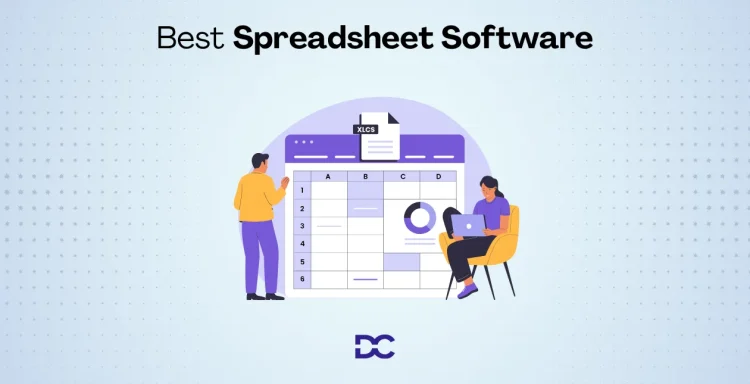Choosing the right spreadsheet software is like picking the best tool for your digital chores. In 2026, there are lots of options, each with its advanced features.
We all have to use the rows and columns interface to manage our data. If anyone wants to save data at scale, then spreadsheet tools are required.
We’ll break down some of the reliable spreadsheet tools to help you find the perfect fit for your needs, whether you’re working on projects, studying, or managing money.
This article talks about the most promising spreadsheet tools that are efficient and good for teamwork, and the right spreadsheet software can change how you get things done, making you more productive.
Now, let’s take a closer look at the top spreadsheet software available in 2026.
What is spreadsheet software?

Spreadsheet software is a type of computer application specifically designed for organizing, analyzing, and manipulating numerical and tabular data.
It provides users with a grid of cells arranged in rows and columns, where each cell can contain text, numbers, or formulas. The intersection of a row and a column is referred to as a cell, and each cell is uniquely identified by a combination of its row and column coordinates.
The primary function of spreadsheet software is to enable users to perform various calculations, create charts, and organize information in a structured manner.
Users can input data into cells, perform mathematical operations using built-in functions or custom formulas, and visualize the data through charts and graphs.
Additionally, spreadsheet software often includes features for data sorting, filtering, and collaboration, allowing multiple users to work on and edit the same spreadsheet simultaneously.
Popular spreadsheet software includes Microsoft Excel, Google Sheets, etc. These tools are widely used in business, finance, education, and various other fields where data analysis and organization are essential.
The flexibility and versatility of spreadsheet software make it a fundamental tool for professionals and individuals alike in managing and interpreting data efficiently.
Choosing the Best Spreadsheet Software

Picking a spreadsheet tool is like choosing the best tool for a job. Here are some simple tips to help you decide:
Know What You Need
First, figure out what you want to do with the spreadsheet. Are you using it for personal stuff, work, or something else? Knowing your goal helps narrow down your options.
Think About Working Together
If you share your work with others, think about software that lets people work on it together. Google Sheets is suitable for this because it’s online, and lots of people can use it at the same time.
Consider How Easy It Is
Some spreadsheet tools are easier to use than others. If you’re used to something like Microsoft Excel, you might want to stick with that. But if you’re okay with learning new things, there are fantastic options like Airtable, even though they might take a bit more time to learn.
Look at the Cost
Some spreadsheet tools cost money, while others are free. If you’re on a budget, you might want to check out free options like Google Sheets or LibreOffice Calc. But if you need some fancy features, you might have to pay a bit.
Think About What You’re Using It For
Are you using the spreadsheet for work projects, personal stuff, or maybe both? Some tools, like Smartsheet, are great for work projects, while others, like Google Sheets, are good for all kinds of things.
Comparison Table
To facilitate decision-making, let’s compare these spreadsheet tools based on critical criteria:
| Software | Features | Collaboration | Compatibility | Cost |
|---|---|---|---|---|
| Microsoft Excel | Comprehensive | Limited real-time collaboration | Windows, macOS | Paid license, varying pricing plans |
| Google Sheets | Cloud-based, real-time | Strong collaboration capabilities | Web-based, cross-platform | Free with Google account, premium options |
| LibreOffice Calc | Open-source, multi-platform | Limited real-time collaboration | Windows, macOS, Linux | Free |
| Apple Numbers | Apple ecosystem integration | Limited cross-platform | macOS, iOS | Free with Apple devices, iCloud integration |
| Zoho Sheet | Collaboration, automation | Seamless collaboration | Web-based, cross-platform | Free with limited features, premium options |
| WPS Office Spreadsheets | Familiar interface | Cross-platform functionality | Windows, macOS, Linux | Free, premium options |
| Quip Spreadsheets | Collaboration emphasis | Integrated with collaborative tools | Web-based, cross-platform | Paid subscription |
| Smartsheet | Project management focus | Collaboration features | Web-based, cross-platform | Paid subscription |
| Airtable | Database-like flexibility | Collaboration features | Web-based, cross-platform | Free with limited features, premium options |
Top Spreadsheet Software to consider in 2026
Microsoft Excel
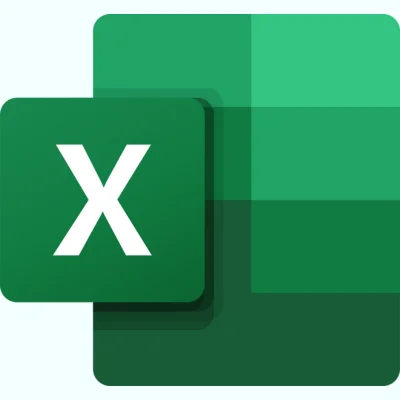
Microsoft Excel is a trendy tool used by lots of businesses. 88% of companies use it, and over 1 billion people worldwide use it too.
It’s great for organizing data with tables, doing math with formulas like SUM and AVERAGE, and making charts to see information better. However, it can be a bit tricky for beginners, especially with advanced features, and extensive files might make it slow.
Microsoft keeps updating it, and you can use it on your phone, too. If you want a free option, there’s Google Sheets and LibreOffice Calc. Overall, Excel is a powerful and widely used tool for spreadsheets.
Features
- Comprehensive Formulas
- Advanced Charting
- Data Analysis Tools
- Customization
- Integration
- Conditional Formatting
- Collaboration Features
- Data Validation
- Power Query and Power Pivot
- Security
- Macros and Automation
- Version History
Google Sheets
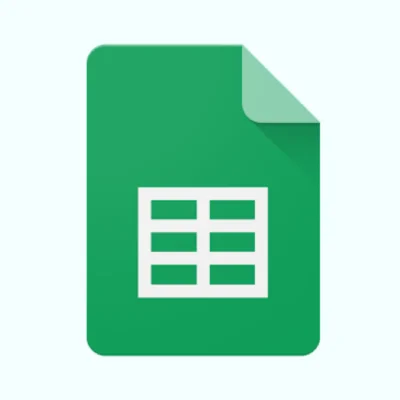
Google Sheets is an online tool within Google Docs, similar to Excel, used for organizing data and creating charts. With 21% of businesses adopting it and over 1 billion users globally, it emphasizes real-time collaboration and cloud accessibility.
Its strengths lie in being free, web-based, and securely storing data. Users can collaborate instantly, access spreadsheets anywhere, and integrate seamlessly with Google Workspace.
However, limited offline functionality, potentially less power than Excel, and dependence on internet connectivity are drawbacks. Regular updates, mobile accessibility, and integration capabilities make Google Sheets a compelling alternative for many users, prioritizing simplicity and teamwork.
Features
- Cloud-Based Access
- Real-Time Collaboration
- Cross-Platform Compatibility
- Offline Functionality
- Built-in Templates
- Formulas and Functions
- Data Visualization Tools
- Integration with Google Workspace
- Automatic Saving
- Revision History
- Data Import and Export
- Add-Ons
Apple Number
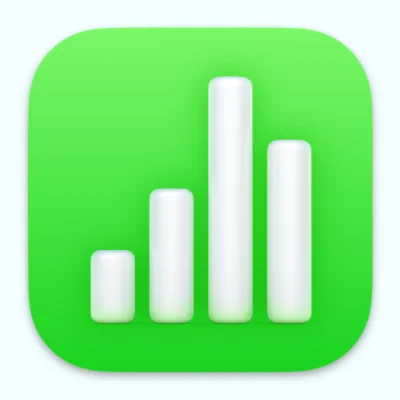
Apple Numbers is a unique tool for making lists on Apple devices like Macs and iPhones. Even though not everyone uses it, however, it has a sufficient user base.
It’s available to Apple users, which is a lot— around 515 million for Macs and 1.8 billion for iPhones. This spreadsheet tool for Apple users is acceptable because it’s easy to use, looks nice, and fits well with other Apple apps.
You can make different kinds of lists, and it’s free if you have a Mac or iPhone. But it’s not as powerful as Excel, and you can only use it on Apple devices. Still, for simple lists and Apple fans, it’s a good choice.
Features
- Apple Ecosystem Integration
- Intuitive Interface
- Collaboration Tools
- Built-in Templates
- Data Visualization
- Cross-Device Sync
- Formulas and Functions
- Security
- Cloud Access
- Version History
- Interactive Charts
- Free Access
LibreOffice Calc
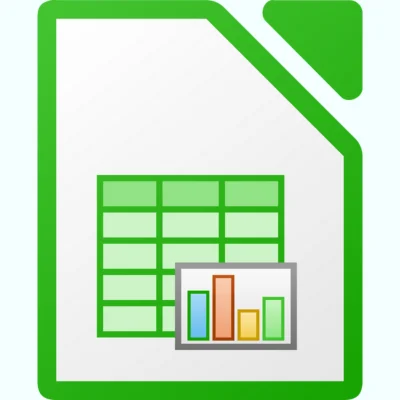
LibreOffice Calc, a free spreadsheet tool in the LibreOffice suite, is used by about 4 out of 100 people for lists (source: Datanyze, 2023), with over 70 million users worldwide.
Comparable to Excel and Google Sheets, it’s cross-platform and open source, allowing customization. While offering advanced features, it may have a steeper learning curve, and its interface might not be as visually appealing.
Despite occasional compatibility issues, it stands out as a cost-free, feature-rich alternative with strong community support. It is ideal for those who value open-source principles, seek advanced functionalities, and are willing to navigate a learning curve.
Features
- Open-Source
- Cross-Platform Compatibility
- Extensive Formulas
- Data Analysis Tools
- Multi-Language Support
- Compatibility
- Customization Options
- Regular Updates
- Integrated Applications
- Macro Support
- Documentation and Support
- No Licensing Costs
Zoho Sheet

Zoho Sheet, part of Zoho Office, is an online tool for creating lists and charts, similar to Excel and Google Sheets. While its user base is less than 5%, Zoho claims over 60 million users across its platform.
It stands out with real-time collaboration, cloud storage, AI-driven features like Insights by Zia, and seamless integration with other Zoho apps. Strengths include affordability, mobile accessibility, and regular updates.
Challenges lie in its smaller user base, a strong tie to the Zoho ecosystem, and dependence on the internet. Zoho Sheet is a robust choice for collaborative and automated spreadsheet tasks, particularly within the Zoho environment.
Features
- Collaboration Emphasis
- Automation Capabilities
- Web-Based Access
- Cross-Platform Functionality
- Integration with Zoho Suite
- User-Friendly Interface
- Data Visualization
- Data Security Measures
- Formulas and Functions
- Customizable Views
- Conditional Formatting
- Free Access with Premium Options
WPS Office Spreadsheets

WPS Office Spreadsheets is a valuable tool for creating lists and charts, either for free or with added features through payment. It’s used by around 6-8 out of 100 people and is recognized for its compatibility with Microsoft Excel.
With over 1.5 billion installations worldwide, it ensures smooth transition and compatibility with Excel files, offering a variety of features like formulas, pivot tables, and macros.
Available on different devices, it provides flexibility. While the free version is cost-effective and compatible, advanced features and collaboration options require payment. WPS Office Spreadsheets stands out as a reliable choice for those seeking affordability and Excel compatibility.
Features
- Familiar Interface
- Cross-Platform Functionality
- Compatibility
- Built-in Templates
- Advanced Formulas
- Cloud Integration
- Collaboration Tools
- Data Analysis Features
- Customization Options
- Free and Premium Versions
- Security Features
- Regular Updates
Quip Spreadsheets
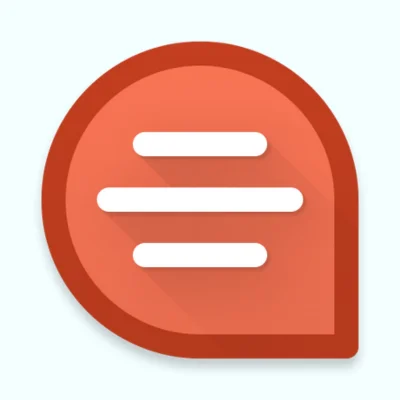
Quip Spreadsheets, a new tool, stands out for collaborative list-making within the Quip platform. With a market share below 1%, it’s gaining notice for real-time teamwork.
Around 8 million people use Quip, potentially including Quip Spreadsheets users. It allows simultaneous editing and task setting, integrating with Salesforce and Dropbox.
While great for teamwork and accessible anywhere, it may lack advanced features and has a smaller user base. Some parts require payment. Ideal for collaborative tasks, Quip Spreadsheets suits those valuing teamwork, but for extensive features or individual use, other options might be more suitable.
Features
- Collaboration Emphasis
- Integration with Collaborative Tools
- Web-Based Access
- Cross-Platform Functionality
- User-Friendly Interface
- Real-Time Collaboration
- Version Control
- Chat and Comment Features
- Data Visualization
- Mobile Accessibility
- Customizable Views
- Paid Subscription Model
Smartsheet

Smartsheet is an online tool blending lists with project tools for work management. Around 3-5 out of 100 use it, with over 1 million paying users.
It’s versatile for various jobs, promotes teamwork, automates tasks, and ensures data security. However, it might be challenging for some users, costs money for individuals/small groups, relies on the internet, and is more suitable for work projects than simple lists.
Overall, Smartsheet offers a robust work solution, combining spreadsheet familiarity with project management tools, but it may not be the best fit for everyone due to its learning curve, cost, and online dependence.
Features
- Project Management Focus
- Collaboration Features
- Web-Based Access
- Cross-Platform Functionality
- Automated Workflows
- Gantt Charts
- Resource Management
- Customizable Views
- Reporting and Dashboards
- File Attachments
- Mobile Accessibility
- Subscription-Based Model
Airtable

Initially launched in 2000, Apache OpenOffice Calc emerged as an open-source alternative to Microsoft Excel. Donated to the Apache Software Foundation by OpenOffice.org in 2011, recent efforts have been made to modernize the software.
Key features of Apache OpenOffice Calc include the Scenario Manager for “what if” calculations and the ability to create formulas using natural language. This free software is compatible with Windows, Mac, and Linux platforms.
Features
- Database-Like Flexibility
- Customizable Fields
- Grid and Kanban Views
- Integration with Collaborative Tools
- Mobile Accessibility
- Formulas and Functions
- Attachments and Linking
- Rich Media Support
- Automation
- Free with Premium Options
What can I use spreadsheet software for?
Spreadsheet software offers a versatile tool with a wide range of applications, both personal and professional. Here are some common uses for spreadsheet software:
- Budgeting and finance: Track income, expenses, savings, and create budgets to manage your finances effectively.
- Organizing data: Organize contacts, to-do lists, shopping lists, event planning details, and any other personal information you need to keep track of.
- Tracking goals and progress: Monitor progress towards personal goals, fitness routines, weight loss, or any other self-improvement journey.
- Analyzing personal data: Analyze spending habits, identify areas for improvement, or track other personal metrics for insights.
- Creating recipes and meal plans: Create and organize recipes, calculate nutritional information, and plan your meals.
- Data analysis and modeling: Analyze large datasets, perform calculations, create charts and graphs, and build data models for informed decision-making.
- Project management: Track project tasks, timelines, budgets, resources, and collaboration efforts within a team.
- Inventory management: Track inventory levels, manage stock, and reorder supplies as needed.
- Financial reporting and analysis: Create financial reports, track key performance indicators (KPIs), and analyze financial data.
- Sales tracking and forecasting: Track sales performance, analyze trends, and create sales forecasts.
- Customer relationship management (CRM): Organize customer information, track interactions, and manage customer relationships.
- Creating invoices and bills: Generate professional invoices and bills for your clients or customers.
- Performing statistical analysis: Analyze data using various statistical functions and tools.
- Creating presentations: Use data and charts from spreadsheets to create visually appealing presentations.
- Automating tasks: Automate repetitive tasks using formulas, macros, or scripting.
FAQs
Which spreadsheet software is the most cost-effective?
Google Sheets is a cost-effective option with its free access and premium features.
What makes Smartsheet suitable for project management?
Smartsheet’s unique features, such as Gantt charts and project tracking, make it ideal for complex project management.
Are there any free alternatives to Microsoft Excel?
Yes, LibreOffice Calc and Google Sheets offer free alternatives with robust features.
Can I use Airtable for personal organization?
Yes, Airtable’s flexibility allows it to be used for personal organization, project tracking, and more.
Is collaboration possible in open-source spreadsheet software like LibreOffice Calc?
While collaboration is possible, it may be limited compared to cloud-based options like Google Sheets or Zoho Sheets.
Can I use Microsoft Excel on both Windows and macOS?
Yes, Microsoft Excel is compatible with both Windows and macOS operating systems.
What sets Zoho Sheet apart in terms of collaboration?
Zoho Sheet’s seamless collaboration is facilitated by real-time editing, comments, and file sharing, enhancing teamwork.
Conclusion
In conclusion, finding the best spreadsheet software in 2026 depends on your specific needs. Microsoft Excel stands out with its comprehensive features, while Google Sheets excels in collaboration.
LibreOffice Calc offers a free alternative, and Apple Numbers integrates seamlessly into the Apple ecosystem. Zoho Sheet prioritizes collaboration, WPS Office Spreadsheets ensure cross-platform functionality, and Smartsheet focuses on project management.
Airtable provides a unique blend of spreadsheet and database features. Looking forward, the integration of AI and automation in spreadsheet tools promises enhanced user experiences.
Consider your budget, collaboration preferences, and required features to make an informed choice.

